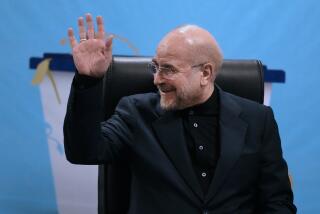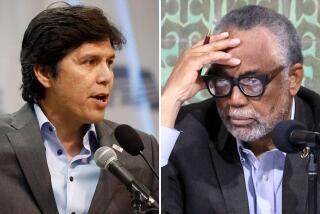Iraqi Council Nominates a Prime Minister
BAGHDAD — A secular Shiite Muslim, a former Baathist who lived in exile for more than 25 years in Britain, emerged Friday as the consensus candidate to lead the interim Iraqi government after sovereignty is returned at the end of June.
Iyad Allawi, whose political party, the Iraqi National Accord, has long-standing ties to the CIA, was unanimously named to become prime minister by the U.S.-appointed Iraqi Governing Council in a surprise move.
Western officials were taken aback by the council’s sudden action but insisted that they would support Allawi, a 58-year-old physician who had lobbied for the job in recent days.
The council’s announcement appeared to be a tactic to head off U.N. and U.S. efforts to promote someone independent of the current political structure. The council, perhaps fearing a loss of power, acted to name one of its own.
Even though he is a secular Shiite, Allawi won the tacit approval of the top Shiite Muslim cleric, Grand Ayatollah Ali Sistani, which is key because Shiites make up a majority of the population. Allawi’s political party has also worked closely with ethnic Kurds and Sunni Muslims.
Allawi returned to Iraq only after the U.S. had deposed President Saddam Hussein, so it was unclear how much of a following he has outside the capital. His ties to the U.S. and the CIA could also work against him.
U.N. officials said Allawi was always a candidate, though they expressed surprise at the council’s action.
In a telephone interview, Lakhdar Brahimi, the U.N. envoy in charge of putting together the interim government, said the process had not played out quite as he envisioned. Allawi was “on the list” of leaders most parties could live with, and he is just one member of an entire government that will be carefully calibrated to represent all Iraqis’ interests, he said.
The Governing Council’s action requires consultation with the United Nations and the U.S.-led Coalition Provisional Authority before the interim government takes office July 1.
“At the end of the day, you will have to have a government that is a compromise between all these views of people in power and people who are not in power,” Brahimi said. “I hope that Iraqis will find him acceptable. I really don’t know. He certainly has lots of friends. I presume he has lots of critics. I hope that the Iraqis will pass judgment on the whole government.
“I think that it is important to remember what is happening here,” Brahimi said. “This is a country that is occupied, where a war is going on. There is an attempt to move away from the situation of occupation toward sovereignty and independence and, I hope, stability and peace. Putting the government together has to take into consideration all those fractures.”
U.N. spokesman Fred Eckhard, when pressed, declined to say that Brahimi or Secretary-General Kofi Annan welcomed or endorsed the naming of Allawi.
“The secretary-general respects the decision, as I said Mr. Brahimi does. ‘Respect’ is a very carefully chosen word,” he said.
Caught off guard by the announcement, some diplomats expressed concern that the Iraqis’ preemptive action might undermine U.N. credibility.
“Brahimi was asked to come shepherd the process by the Governing Council and the CPA -- if only for him to provide a veneer of legitimacy for the process,” a U.N. diplomat said. “For them to preempt his efforts is quite damaging, not only for the U.N.’s credibility but for their own.”
Already dissatisfied with a draft resolution that most U.N. Security Council members say does not give the new government enough power, diplomats said they were uncomfortable endorsing a government without knowing how it was picked.
“It’s not so important that he has credibility with us,” said Angolan Ambassador Ismael Gaspar Martins. “The most important thing is that he has credibility with the Iraqi people. We’ll have to wait and see.”
The candidates for the other key posts have yet to be announced, but it appears that the number has narrowed. Two Governing Council members, Ghazi Ajil Yawer and Adnan Pachachi, are under consideration for president, with Yawer expected to be named. Adel Abdul Mehdi and Ibrahim Jafari, also involved with the council, are among those being considered for the two vice president slots.
The prime minister will oversee a government of 26 ministers and will work closely with the president and two vice presidents. Their terms will expire after direct elections, slated for early 2005, when a national assembly is chosen and helps form a government.
However, the security situation in the country is so poor that it is possible elections will have to be pushed back, said a number of Governing Council members, and that could mean that the government put in place now would hold power longer.
The council, increasingly concerned with preserving its power, has worked steadily to challenge Brahimi’s effort to create an apolitical government. It rejected the idea of excluding politicians from taking jobs in the interim government because that would have meant they could not hold any of the jobs as ministers.
It also pushed to include members of political parties, rather than outsiders, in the new government. Most of the council members are key players in political parties.
After the name of a possible prime minister leaked this week -- Hussein Shahristani, a scientist and an independent without political connections -- the council appears to have decided to take matters into its own hands and nominate a candidate who had more in common with them. Allawi was among the first members of the Governing Council and has been a key member since the body was formed last year.
Though people involved in the process were reluctant to criticize the council’s choice, Joost Hiltermann of the think tank International Crisis Group said he considered the development “dangerous.”
“Iyad Allawi could be a divisive figure. What the interim Governing Council is trying to do is appeal to Iraqis and say, ‘Look, we’re Iraqis.’
“I’m not so sure that Iraqis want a former Baathist, a former exile and someone against whom there have been a lot of charges of nepotism as well as CIA links,” Hiltermann said.
The Bush administration put a far more sanguine spin on the situation, presenting Allawi as a choice endorsed by a wide range of players.
“The idea that this was engineered by the Governing Council is simply untrue,” a senior administration official in Baghdad said. “The Governing Council just got involved in the past 48 hours. It’s still very gratifying that they unanimously endorsed him.”
At least two members of the council did not attend Friday’s session.
The senior administration official added that Allawi had done a good job of lobbying people and that a groundswell of support for him had emerged in the last 10 days.
Allawi played his cards close to the vest, saying as recently as Wednesday in an interview with The Times, “I don’t know if I will have any role in the new government.”
His name was put forward by the majority of the Shiite Muslims on the council, said Adel Murad, a top aide to Kurdish leader Jalal Talabani, who had also hoped to win the top post. It is now widely expected that the Kurds will bargain hard for positions in ministries or other concessions because they did not get the slot they wanted.
Murad said the Kurds want areas that were once Kurdish but were “Arabized” by Hussein returned to them -- including the oil-rich city of Kirkuk and the area around Sinjar. He said the Kurds would not accept a vice presidency.
The Shiites have been adamant about having one of their own fill the position of prime minister. However, there are many Shiite parties, and they could not agree on who should get the post, according to several council members.
“The two big Shiite parties could not agree on one candidate so the choice of Allawi became the only choice. There was no one else to choose,” said Mahmoud Othman, an independent Kurd, noting that both the Dawa Party and the Supreme Council for Islamic Revolution in Iraq had been afraid the other would get the post of prime minister.
He added, “Some people think he’s a good choice, others say we have to live with it.”
Sunni and Kurdish members went along with the choice because Allawi is not a particularly sectarian figure and, because he is a former Baath Party member, many Sunnis feel relatively comfortable with him.
Furthermore, as head of the council’s security committee, he could be an effective force for bringing the country’s instability under control.
Council members are feeling especially vulnerable now because of the recent assassination of Council President Ezzedine Salim and the attempted assassination Thursday of Salama Khafaji, one of the three female council members.
“The most important problem right now is security,” said Hachim Hassani, deputy representative of the Iraqi Islamic Party, the most powerful Sunni group. Hassani was among those who backed Allawi.
The difference in the U.S. and U.N. reactions to Allawi is rooted in priorities. From the United States’ point of view, it will be easier to work with someone it already knows.
Furthermore, as a secular figure, he would at least delay the advance of religious fundamentalism in Iraq -- a deep concern of the Bush administration.
Brahimi had hoped to sway Iraqis that it would be to their political advantage to choose a government made up of people with expertise in various fields, a reputation for probity and little interest in remaining in the government after shepherding the country to its first national elections.
Choosing Allawi means that the new government will look a lot like the current Governing Council, said Toby Dodge, an Iraq expert at the University of Warwick in Britain.
It will have “the same problems of corruption, lack of popular support and alienation of trust from the people that characterized the first Iraqi Governing Council,” he said.
Rubin reported from Baghdad and Farley from the United Nations. Times staff writer John Daniszewski in London contributed to this report.
More to Read
Sign up for Essential California
The most important California stories and recommendations in your inbox every morning.
You may occasionally receive promotional content from the Los Angeles Times.










